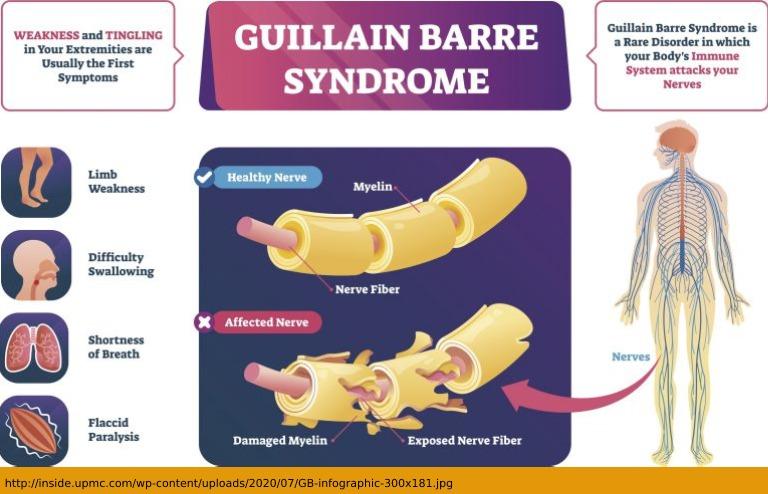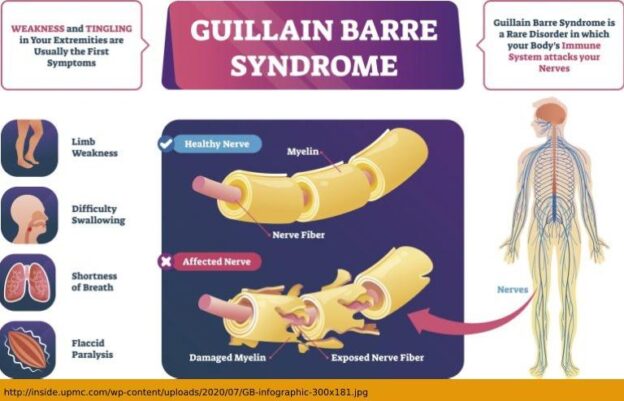Guillain-Barré syndrome is a rare disorder in which the immune system damages nerve cells, resulting in total muscle weakness, and sometimes paralysis. Symptoms usually appear one to six weeks after respiratory or gastrointestinal infection with Campylobacter jejuni and other organisms.
Although uncommon, Guillain-Barré syndrome can strike anyone at any age. While 80% recover, some people remain permanently paralyzed and 1% of people will die from complications such as respiratory failure or cardiac arrest.
. Guillain-Barré syndrome is not a single disease, but a spectrum of disorders of varying severity.
The cause of Guillain-Barré syndrome is not known, but in most cases, people who develop the condition have recently been sick with viral or bacterial infection and have developed an immune system response to that infection.
Dr. Mohana Rao Patibandla of Dr. Rao’s hospital, the best Neuro hospital in Guntur, Andhra Pradesh says that these infections include influenza (flu), gastroenteritis (infection of the stomach and intestines), pneumonia, dengue fever, and infectious mononucleosis caused by the Epstein–Barré syndrome virus (EBV).
It can cause
- Muscle weakness with some people going into a state of total paralysis.
- Cramps in Body
- Pain In Body
- Different Aches
There is cure and the condition generally leads to death in a very few cases. The syndrome most often begins in the feet and legs, causing muscle weakness that can produce rapid weakness which is of ascending type that means starts in the legs and goes upwards and other movements possibly indicating nerve damage. According to the best Neurosurgeon in Guntur, this disease if we find early we can cure it.

Causes of Guillain-Barré syndrome
Guillain-Barré syndrome is a rare disorder that is triggered by an infection of the nervous system. It has been linked to many types of infections, with the most frequent bacteria being Campylobacter jejuni (75%), but other bacteria have also been implicated such as group A beta-hemolytic streptococci, Salmonella typhi and E. coli. Infections of the nervous system are believed to be caused by an immune response to the infection that attacks components of nerves in peripheral nerves and the spinal cord, causing symptoms similar to those seen in Guillain-Barré syndrome.
The best neuro doctors in Guntur say that two possible processes have been suggested. The first one is that an infection may produce antibodies (autoantibodies) in the blood which attack peripheral nerves and their coverings, the myelin sheath.
The other possible mechanism is that infections may cause the body to produce immune cells called T cells that attack nerves directly.
Duration of Guillain-Barré syndrome
Guillain-Barré syndrome can last for a few weeks or months, depending on how quickly the immune system responds, with recovery occurring within 3 to 6 months in 80% cases and up to 12 months in some cases.

Problems after having Guillain-Barré syndrome
- During recovery from Guillain-Barré syndrome, the spinal cord is damaged and can be vulnerable to further damage.
- Once someone has had a Guillain-Barré syndrome attack, it is important for them to take measures for their safety such as avoiding physical activity, wearing seat belts and being careful around equipment that may be dangerous during an attack.
This condition is well understood by the best spine specialists in Guntur, Andhra Pradesh and most people and can be scary for those who experience it.
Most of the time people who have this condition recover from it after one to four weeks. After recovery from this disease, many people will not have any further problems with this illness.
The patient is admitted to hospital after diagnosis for monitoring of:
- Respiratory Function
- Cardiac Function
- Motor Strength
- Blood Pressure
- Neurological Status
- Mobility and gait pattern
Treatment
Guillain-Barré syndrome is treated with the use of immunoglobulins to help manage paralysis. The steroids or immunoglobulins IVIG are usually given by injection intravenously.
Antibiotics are also used to treat any concomitant infections that may be present and to reduce inflammation in the body. The best neurology hospital in Guntur suggested having good ICU care is important in proper recovery.
80% people will recover fully within six months or less, but some parts of the body can stay paralyzed permanently.

You should vigorously do the physiotherapy and occupational therapy in the severely involved patients can do the following
● Physical therapy to regain strength
● Walking and Moving for doing daily tasks
Can COVID-19 vaccine will cause Guillain-Barré Syndrome?
The risk of developing Guillain-Barré syndrome following a course of vaccination is small, with most affected people having documented prior exposure to the disease, and having had their vaccination sometime after infection (rather than concurrently). Nevertheless, there may be a small risk that an infected person could develop Guillain-Barré syndrome following immunization.
SYNOPSIS
Guillain-Barré syndrome (GBS) is a rare but serious autoimmune disorder that affects the peripheral nervous system. The exact cause of GBS is unknown, but it is thought to be triggered by an infection or other immune system disorder. Symptoms of GBS can range from mild to severe, and may include muscle weakness, paralysis, and even death. Early diagnosis and treatment of GBS is critical for the best possible outcome.
What is Guillain-Barré Syndrome?
Guillain-Barré syndrome (GBS) is a rare but serious autoimmune disorder that affects the peripheral nervous system. The exact cause of GBS is unknown, but it is thought to be triggered by an infection or other immune system disorder. Symptoms of GBS can range from mild to severe, and may include muscle weakness, paralysis, and even death. Early diagnosis and treatment of GBS is critical for the best possible outcome.
What are the symptoms of Guillain-Barré Syndrome?
Symptoms of GBS can range from mild to severe. Early symptoms may include muscle weakness, tingling, or numbness in the extremities. These symptoms can quickly progress to paralysis, and may even affect the muscles used for breathing. In some cases, GBS can be fatal. Early diagnosis and treatment is critical for the best possible outcome.
Conclusion:
Guillain-Barré syndrome is a rare but serious autoimmune disorder that can have devastating consequences. Early diagnosis and treatment is critical for the best possible outcome. If you or someone you know is experiencing symptoms of GBS, seek medical help immediately.
Looking for the best GBS or Guillain Barre syndrome treatment in Guntur, dont look further, visit Dr Raos hospital, Guntur, Andhra Pradesh, India – 522001. Contact us @9010056444 or 9010057444.



